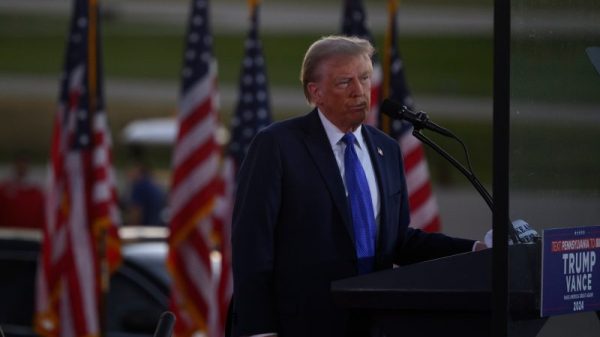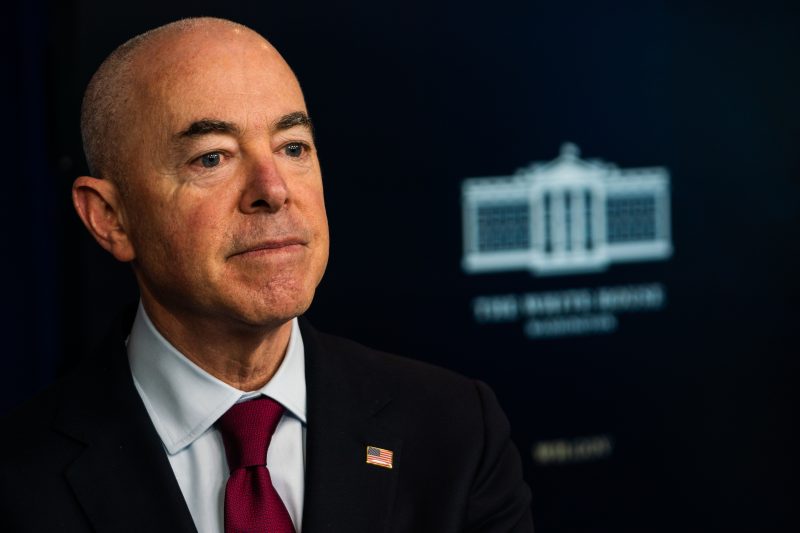Homeland Security Secretary Alejandro Mayorkas became the first sitting Cabinet secretary to be impeached Tuesday — with House Republicans succeeding in the public rebuke of the Biden administration’s immigration policies. The impeachment passed by a single vote.
It was House Republicans’ second attempt to impeach Mayorkas, after a similar vote narrowly failed last week. Democrats and some scholars have voiced concern about impeachment — the most serious tool the U.S. Constitution provides to rein in a public official — being used as a partisan weapon.
The Democratic-led Senate will now take up the case against Mayorkas, but the higher chamber is unlikely to convict him because a two-thirds majority is required. Both Democrats and Republicans in the Senate have cast doubt on House Republicans’ impeachment efforts, arguing that they have presented no evidence that Mayorkas committed a crime or misdemeanor.
Here’s what to know about what happened, and what’s next for Mayorkas.
Moves to impeach Cabinet members are extremely rare: The last took place almost 150 years ago, when William Belknap — the secretary of war for President Ulysses S. Grant — resigned just before he was impeached on corruption charges. In that case, a House committee found and presented evidence that Belknap had committed a misdemeanor by accepting bribes in exchange for profitable contracts.
On Tuesday, House Republicans voted to impeach Mayorkas on counts of “willful and systemic refusal to comply with the law” and “breach of public trust” related to his handling of immigration and security at the U.S.-Mexico border. All Democrats present opposed the move — together with Republican Reps. Mike Gallagher (Wis.), Ken Buck (Colo.) and Tom McClintock (Calif.), who also voted against last week’s attempt, saying the case doesn’t meet the bar for impeachment.
“Mayorkas has not committed a high crime or a misdemeanor,” Buck told ABC News after House Republicans first failed to impeach the secretary. “He’s not doing a lot of the things … that would help alleviate the [border] crisis, but those are policy differences, not a crime.”
Despite the impeachment vote, Mayorkas still has his position. The Senate now has to consider whether to convict Mayorkas and oust him.
Senate Majority Leader Charles E. Schumer (D-N.Y.) said that the appointed House Republican impeachment managers will present the articles to the Senate when senators return to Washington at the end of the month. Senate President Pro Tempore Patty Murray (D-Wash.) will preside over a trial, Schumer’s office said.
There is a higher bar to convict Mayorkas than there was to impeach him. Two-thirds of the Democratic-controlled Senate must vote to convict him. Given the challenges House Republicans had impeaching Mayorkas, this makes conviction in the upper house a longer shot. While the Senate has not yet picked up the case against Mayorkas, senators from both sides of the aisle have already expressed opposition to the impeachment effort.
No Senate Democrats have indicated support for removing Mayorkas from office, and at least 10 Senate Republicans have publicly expressed concerns about the impeachment effort or fully disavowed it — making it likely that Mayorkas will not be convicted.
“It’ll fail in the Senate,” Sen. James Lankford (R-Okla.) told reporters last week. “If I could use the House term: It’ll be dead on arrival when it comes over.”
And while Schumer’s office has detailed the next steps for a trial, there may be ways for senators to avoid one if they want to. As The Post has reported, the Senate could opt to refer the articles of impeachment to a smaller committee or move to vote on a motion to dismiss the charges, instead of holding a trial.
Casey Burgat, the director of the Legislative Affairs Program at George Washington University’s Graduate School of Political Management, told The Post in an email that the Senate “has freedom to conduct the impeachment as they see fit.”
“Schumer and Democrats have options under the rules, ranging from holding an extremely truncated trial — with the option to vote to dismiss after the House managers present their case, again with the Senate deciding how long they have to do so — to creating an evidentiary committee to consider the case — which they can slowplay until after the election or through the entire Congress so the Senate never is forced to deal with the actual vote to convict,” Burgat said.
Mayorkas, meanwhile, is free to continue doing his job.
“I’m doing my work,” Mayorkas said in an interview with The Post earlier this month, adding that he was “making sure it doesn’t distract me from it.”
House Republicans argue that impeachment — and ultimately, conviction — is a necessary course of action because, in their view, Mayorkas has failed to enforce U.S. immigration policies and this has led to the surge of illegal border crossings. In a report gathered by the Homeland Security Committee last year, Republicans argued that Mayorkas has failed to “enforce laws passed by Congress” and to “fulfill his oath of office.” They also said he has been derelict in his duty to secure the border, citing a 2006 law that requires the secretary of the Department of Homeland Security to maintain “operational control” over the border. Mayorkas and DHS have long counter-argued that no homeland security secretary or president has maintained “operational control” of the border under the definition specified by that 2006 law.
Democrats have accused House Republicans of using impeachment as a political tool ahead of the November election.
“History will not look kindly on House Republicans for their blatant act of unconstitutional partisanship that has targeted an honorable public servant in order to play petty political games,” President Biden said in a statement after Tuesday’s impeachment vote.
Some Senate Republicans have also argued that their House colleagues’ effort to remove Mayorkas from office is only a detour distracting from other work. Sen. Kevin Cramer (N.D.) told reporters that the effort is “the dumbest exercise and use of time.” In an op-ed published in the Wall Street Journal, Gallagher — one of the three House Republicans who voted against impeachment — noted that Mayorkas is simply following the policies of the Biden administration and that doing so is not an impeachable offense.
“Impeachment not only would fail to resolve Mr. Biden’s border crisis but would also set a dangerous new precedent that would be used against future Republican administrations,” he wrote.
Constitutional experts who have testified for both Democrats and Republicans agreed that Congress should not remove Mayorkas from office simply because House Republicans disagree with how he’s executed his job. University of Missouri law professor Frank O. Bowman III told the House Homeland Security committee in January that, under the Constitution, impeachment “is not supposed to be a routine tool to resolve ordinary public policy debates, even very passionate ones.”
George Washington University Law School professor Jonathan Turley told The Post that impeachment “was never supposed to be a type of vote of no confidence.”
“Impeachment should not be used to amplify objections to policies or priorities of a president,” Turley said. “To allow a casual use of impeachment is to invite chaos.”
Republicans have also not clearly explained what impeaching Mayorkas would accomplish in changing immigration policy and addressing the situation at the border. In an interview with The Post last month, Bowman noted that if — and it is a big, unlikely if — Mayorkas is ultimately convicted by the Senate, Biden would simply appoint someone else to the job.
While impeachment efforts were underway, there were more than 250,000 arrests for illegal crossings at the United States’ southern border in December — a record high. However, administration officials and preliminary data this month indicated that the figure for January dropped to about 150,000, The Post reported.



























